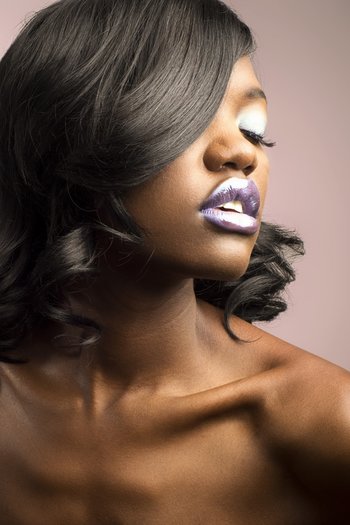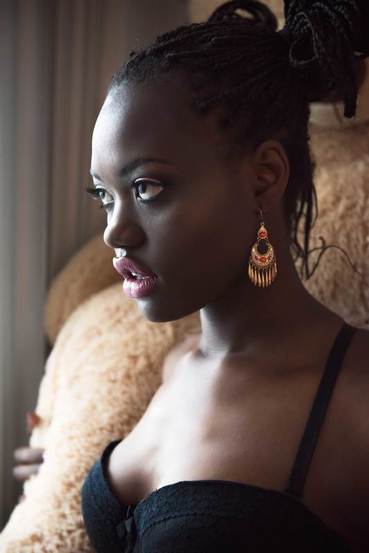|
Amanie Illfated is a singer/songwriter and model living in Toronto. 1. Which stories do you think have made the greatest impact on you? One of the biggest stories to impact my life was Oprah’s. Growing up, it was very hard to find successful black females to look up to and Oprah was the only one that I could find at the time, but she was the most suitable. She had a very hostile and traumatic upbringing and had made so many mistakes, yet worked so hard and always pushed to succeed. Her work ethic became mine and her story made me realize that no matter what happens to you in the past, you can still have a future so long as you don’t give up. 2. When did you realise you were a singer? I realized that I was a singer at around 4 years old. My family had only been in Canada for a year and adapting to the country was difficult for my family and for me and, even at that age, I felt like something was missing in my life. This changed one day when my sister and my cousins were playing ‘lava’ in the living room and Celine Dion came on the CBC channel and was she was singing. My world stopped and it was almost like lightning had struck me when it dawned on me that I wanted to do what she does – singing live on stage. 3. Can you describe the process of writing a song – I know the process of writing a script or a piece of prose is often like getting blood out of a stone? Wow! Getting blood out of a stone sounds difficult! Strangely, for me, I don’t even realize when I am writing a song. Songs start with the music – either with my band or with a producer/songwriter. The moment a chord strikes my heart, it’s like all the words just fall from the sky, into my heart, through my hand and onto the paper. I think it has to do with being a very, very emotional person. At times, I don’t really like anything even if the song is striking a chord with my heart. Typically, that would mean I’m not emotionally ready to write that song. 4. How does your South Sudanese heritage inform your work? I came to Canada when I was 3 years old and haven’t gone back home due to the war. My whole life, I was confused as to who I was – since I wasn’t South Sudanese enough for the South Sudanese to consider me as one of them, and I wasn’t Canadian enough to be considered Canadian. Being in Canada allowed me to be liberal and speak out, but in a South Sudanese household, I was forced to be conservative, obey all elders in their wrongdoings and even discard important pieces of education because it wasn’t suitable for South Sudanese. The songs that I was writing seem tame to North American standards, though in my culture you couldn’t talk about those things - songs like ‘Letter to Myself’ which is a suicide letter or ‘Ultimate Candy’ which is about falling in lust or even ‘Don’t Mess With Me’ which is about standing up to a man who tries to control me. Many South Sudanese refuse to address any mental health issues or suicide, they believe a woman cannot be sexual unless it is with her husband and only if he initiates it, and many woman are abused and/or under the control of men and unable to speak up against it. Being South Sudanese was never a big factor in my work until about 2015, when I started working with Yaba Angelosi (a South Sudanese singer and producer based in Nashville). When I began working with Yaba Angelosi, I started to follow a lot of the politics discretely and the news from there began to affect me. The new album I am working on now contains many songs that are heavily influenced by my heritage including ‘The Hills’, which is a song about refugees and immigrants that successfully achieve a better life in North America but are met with racism and discrimination. 5. It is often said that writing for TV and film is one of the most collaborative forms of writing – how much collaboration goes into writing a song and putting an album together? I would say about as much collaboration goes in to writing an album as it does writing for TV and film. You will have a producer, the band, session players (musicians that record their part but are not part of the band) and engineers. Everyone has to contribute to the feel and uphold the vision of the songs, and it’s difficult to tell someone “hey, this song is about how heartbroken I was when I broke up with this guy. Can you get the full emotion of that into your guitar?” In the writing and production phase, everyone is all over the place with input and direction and we’re all stuck in one room for 4-10 hours at a time. Sometimes it gets a little tense. Once everything is written and produced though, it is smooth sailing. 6.’Everything’s Okay’ is a wonderfully positive song – where do you get your positivity from? ‘Everything’s Okay’ was written out of a very numbing pain. My uncle, who I idolized, passed away suddenly in South Sudan, leaving 4 kids behind as orphans. He was a soldier and body guard to John Garang, who was a well-respected South Sudanese leader who was killed in a plane crash in 2005. I had only spoken to him once in my life and the only thing he had ever told in me in Arabic-Juba (one of the primary languages spoken in South Sudan) was ‘I only ask that you finish school. It doesn’t matter what you do in your life, just finish school’. It was different from the expectations of everyone else – which was along the lines of ‘go to school, become a doctor of medicine, an astronaut, a lawyer, a business mogul, the president of 7 countries, a wife and mother to 12 kids all at the exact same time’. When my uncle passed away, my aunt and I were telling everyone that everything is okay and that my uncle was in a better place, even though we were crying and upset. In terms of positivity: in my life, I’ve been through some of the ugliest and traumatic situations and there were so many times when I thought to myself – there’s no way that I will survive this. The strange thing that has gotten me through is time. When I look at a clock, I see that it continues, even though something horrible is going on, the clock will continue and move on to the next minute as if nothing happened. Whenever something bad happened, I would start to tell myself that “that was just a bad hour, or a bad few minutes and now I’m on to the next hour, the next minute or day". Sometimes, I would tell myself "In one year from now (this bad moment), you won’t even remember that this happened". I will learn from that moment and continue knowing that I am still alive and if I am alive, I am still capable of moving on and doing bigger things. 7. In the moments when you’re not feeling positive is there a song you always listen to that picks you back up? This will sound backwards, but whenever I am not feeling positive, I go out and find music that fits my mood. I think one thing that hurts us is always trying to keep all of our emotions positive and not allowing ourselves to really feel what it is that we’re feeling, so I always make sure to take a set amount of time to explore that feeling but not stay there long. For example, last summer I had to make the decision to end a relationship with someone I really loved after a year. I was going through every single emotion and kept playing the song ‘Wake Up’ by Eden, with the opening lyrics “cause we’ve been driving so long, I can’t remember how we got here or how we survived so long”. The song made me cry for hours and hours until I couldn’t cry any more. Once I got over it, I started to play the songs that pump me up: ‘Paper Planes’ by M.I.A, ‘All I Do Is Win’ by DJ Khaled, ‘Underestimated’ by Maestro Fresh, ‘Bigger The Better’ by Nelly Furtado and ‘Bittersweet Symphony’ by the Verve. 8. Who is/are your favourite singer/s and songwriter/s and why? Right now, it is Phantogram , FKA Twigs and M.I.A. I fell head over heels in love with Phantogram about 5 years ago after hearing ‘When I Am Small’, a daunting song that can be interpreted in many ways. What struck me was the vulnerability in the words “show me love; you’ve got your hands on a button now”, which I interpreted as giving your heart to someone who could destroy you at any minute. Their lyrics are so poetic and the music is this amazing cross between rock, hip hop and electronic. Since hearing them, I believe I’ve listened to all their albums on repeat about 150 times each and my Spotify playlist pretty much contains only their music. FKA Twigs stole my heart a few years ago. I was listening to what was known before as Songza and ‘Two Weeks’ came up. Her soft, smooth vocals mixed with a few F-bombs and precise lyrics shocked me. She also had vulnerability in many of her lyrics like in ‘Water Me’, where she says “he won’t make love to me now” or in ‘Video Girl’, where she asks “is she the girl from the video? Stop, stop talking to me.” Her bold lyrics about love and female sexuality really pushed the envelope for me and helped open me up. Lastly M.I.A. really put who I was into perspective. On TV, the only black people I grew up seeing were ghetto/gangster or gospel. It was rare to see a foreigner who knew about war, ate different types of food, whose first language wasn’t English and who saw the world in a completely different light. Her music was so different and what she spoke about was what I either faced or what I saw happening around me. Her stance on fighting for peace and equality and speaking on issues like immigration and border barriers was something unprecedented. 9. What was the last song you heard that took your breath away? The one song that stole not only breath but my heart as well is ‘Blame’ by Zeds Dead & Diplo featuring Elliphant. There is something about the production and Elliphant’s voice and the way she sings the song really hit me hard. Although the lyrics didn’t really suit the situation (since it is about being someone that always strays away and is a free soul), the song was the final push that allowed me to forgive someone who had cheated on me almost 10 years previously. 10. How did your collaboration with Yaba Angelosi come about and what have you taken away from the experience? The collaboration with Yaba Angelosi was almost 4 years in the making. I don’t recall exactly how we got connected, but we started talking about working on a song on Facebook. He is based in Nashville and I am based in Toronto, so we were negotiating whether it would be better for him to come to Canada and we record here, or I go to Nashville and record there. I was waiting for my citizenship confirmation and passport which took nearly 2 and half years to finally get. I worked on my lyrics in Canada and then I decided to go to Nashville to record since I had never been outside the country. Working with Yaba Angelosi in the studio was great. We recorded in a very inconspicuous studio (it had a t-shirt production facility at the front of the building and a nice, high grade studio hidden in the back). Yaba Angelosi mixed the song that night since we were so excited with the results. There were so many production issues that the release of the song took a year. I got to learn a lot about the inner workings of the industry and how different it is to release music in other countries. 11. Are there any other artists you’d like to work with and why? Phantogram would be one of the top artists that I would like to work with. I love their raw approach to recording (they started out recording on a farm in upstate New York) and their absolute passion for music. You can feel their energy through the music. I also love that they are open to so many different genres and experiment with many instruments. 12. You’re currently working on a book – how did that come about? I attended a workshop back in January called My Life Is Art. It was created by Emmanuel Jal, who is a South Sudanese former child soldier turned rapper, entrepreneur and activist. One thing that the workshop taught me is to think larger, demolish any road blocks and to share your experiences in life in as many forms as you can. Writing was something that I’ve always loved to do next to music and I’ve already written novels, so it seemed like the natural thing to do. 13. What other forms of writing – theatre, TV, film or poetry – would you like to try? I’ve dabbled in poetry and I like it but I tend to go off on tangents which makes one poem the size of a dictionary… I’ve never really tried theatre or TV, but down the road, I would love to experiment with film and write empowering dramatic thrillers like ‘Girl; Interrupted’ and ‘Lost in Translation’ and even a foreign film like ‘The Dreamers’ and ‘Gegen Die Wand’. 14. What single piece of advice would you give to someone who is just starting out? There are actually 2 pieces of advice I always tell people:
15. Where will you be in ten years time? In ten years time, I picture myself sitting outside of my house that is next to the beach in the Caribbean holding my child in one arm and iPod in the other hand. It will be after successfully release 3 albums, completing a world tour and launching a successful company that has an initiative to sponsor refugee children from South Sudan and surrounding countries that have been devastated by war. Listen to Amanie Illfated on Spotify or on Youtube.
1 Comment
|
Guest BlogWhere craftsmen and women share their thoughts on storytelling. Archives
January 2018
Categories |



 RSS Feed
RSS Feed